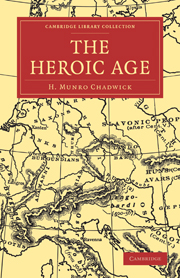Book contents
- Frontmatter
- PREFACE
- Contents
- DEDICATION
- CHAPTER I THE EARLY NARRATIVE POETRY OF THE TEUTONIC PEOPLES
- CHAPTER II THE HEROIC AGE OF THE TEUTONIC PEOPLES
- CHAPTER III SCENE AND NATIONALITY IN THE HEROIC STORIES
- CHAPTER IV THE ORIGIN AND HISTORY OF THE HEROIC POEMS
- CHAPTER V THE POETRY AND MINSTRELSY OF EARLY TIMES
- CHAPTER VI SUPERNATURAL ELEMENTS IN THE HEROIC STORIES
- CHAPTER VII MYTHICAL ELEMENTS IN THE HEROIC POEMS
- CHAPTER VIII THE USE OF FICTION IN THE HEROIC POEMS
- CHAPTER IX THE HEROIC AGE OF GREECE
- CHAPTER X THE HOMERIC POEMS
- CHAPTER XI EARLY GREEK POETRY AND MINSTRELSY
- CHAPTER XII SUPERNATURAL ELEMENTS IN THE HOMERIC POEMS
- CHAPTER XIII MYTH IN THE HOMERIC POEMS
- CHAPTER XIV FICTION IN THE HOMERIC POEMS
- CHAPTER XV THE COMMON CHARACTERISTICS OF TEUTONIC AND GREEK HEROIC POETRY
- CHAPTER XVI SOCIETY IN THE HEROIC AGE
- CHAPTER XVII GOVERNMENT IN THE HEROIC AGE
- CHAPTER XVIII RELIGION IN THE HEROIC AGE
- CHAPTER XIX THE CAUSES AND ANTECEDENT CONDITIONS OF THE HEROIC AGE
- ADDENDA ET CORRIGENDA
- INDEX
- Plate section
CHAPTER XIV - FICTION IN THE HOMERIC POEMS
Published online by Cambridge University Press: 07 September 2011
- Frontmatter
- PREFACE
- Contents
- DEDICATION
- CHAPTER I THE EARLY NARRATIVE POETRY OF THE TEUTONIC PEOPLES
- CHAPTER II THE HEROIC AGE OF THE TEUTONIC PEOPLES
- CHAPTER III SCENE AND NATIONALITY IN THE HEROIC STORIES
- CHAPTER IV THE ORIGIN AND HISTORY OF THE HEROIC POEMS
- CHAPTER V THE POETRY AND MINSTRELSY OF EARLY TIMES
- CHAPTER VI SUPERNATURAL ELEMENTS IN THE HEROIC STORIES
- CHAPTER VII MYTHICAL ELEMENTS IN THE HEROIC POEMS
- CHAPTER VIII THE USE OF FICTION IN THE HEROIC POEMS
- CHAPTER IX THE HEROIC AGE OF GREECE
- CHAPTER X THE HOMERIC POEMS
- CHAPTER XI EARLY GREEK POETRY AND MINSTRELSY
- CHAPTER XII SUPERNATURAL ELEMENTS IN THE HOMERIC POEMS
- CHAPTER XIII MYTH IN THE HOMERIC POEMS
- CHAPTER XIV FICTION IN THE HOMERIC POEMS
- CHAPTER XV THE COMMON CHARACTERISTICS OF TEUTONIC AND GREEK HEROIC POETRY
- CHAPTER XVI SOCIETY IN THE HEROIC AGE
- CHAPTER XVII GOVERNMENT IN THE HEROIC AGE
- CHAPTER XVIII RELIGION IN THE HEROIC AGE
- CHAPTER XIX THE CAUSES AND ANTECEDENT CONDITIONS OF THE HEROIC AGE
- ADDENDA ET CORRIGENDA
- INDEX
- Plate section
Summary
We have now to consider briefly how far the use of fiction, i.e. of conscious, deliberate invention, was permitted in the composition of Greek heroic poetry. This question gave us considerable difficulty when we were discussing the Teutonic poems. It is assuredly not less difficult here. The higher artistic level of the Greek poems cannot but pre-dispose us in favour of the view that their use of fiction is of a more advanced type. This expectation is fully realised in the elaborate presentation of many of the scenes, whether the actors be human beings who may or may not have taken part in the events described, or divine beings whose mythical origin no one will dispute. In the σύστασις τῶν πραγμάτων the art of poetic invention is developed to a high degree of perfection.
The chief difference between our present problem and the one which we had to consider in Chapter VIII lies in the fact that here we are entirely without that contemporary historical evidence which enables us to recognise some characters or events in nearly all the Teutonic poems. The way lies open therefore for regarding the whole story of the siege of Troy as a product of fiction; and this is a view which many modern scholars have adopted. For an example we can scarcely do better than quote the words of the late Sir R. C. Jebb (Introduction to Homer, p. 147): “The tale of Troy, as we have it in Homer, is essentially a poetic creation; and the poet is the sole witness.”
- Type
- Chapter
- Information
- The Heroic Age , pp. 292 - 319Publisher: Cambridge University PressPrint publication year: 2010First published in: 1912



